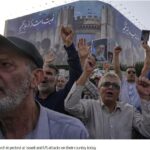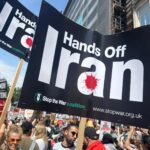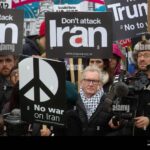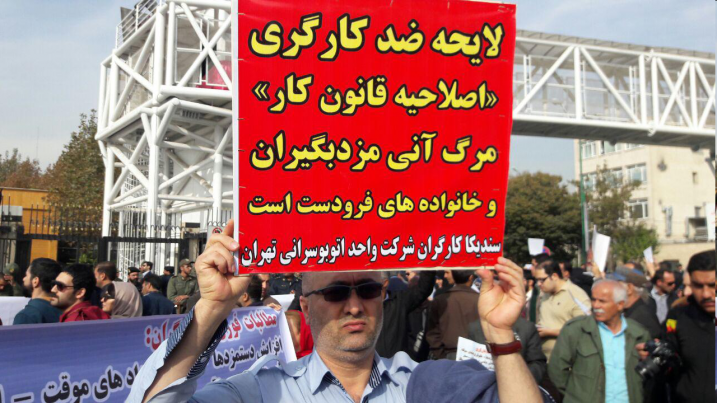
In October, the Union of Metalworkers and Mechanics of Iran (UMMI) became the first affiliate from Iran to join IndustriALL. The affiliation is a significant step in a country where unions are persecuted and trade unionists imprisoned.
PROFILE
Union: Union of Metalworkers and Mechanics of Iran (UMMI)
Country: Iran
Text: Walton Pantland
The Iranian free and independent union movement fights for fundamental labour rights, despite repression, imprisonment, executions, and extrajudicial murder.
UMMI was originally formed in 1960. After 1983 the union was forced to operate underground for more than two decades, but since 2005, it has operated openly. Although not officially recognized by the state or employers, UMMI represents a considerable number of workers in vehicle assembly, components factories, steel plants and detergent companies.
The union is not able to operate openly in the workplace, as workers suspected of being union members are dismissed and arrested. Despite this, the union is able to mobilize workers, who are inspired by UMMI’s independence, militancy and resistance.
Iran is ruled by an authoritarian theocratic regime, and is considerably behind international standards on labour rights. It has yet to ratify the core International Labour Organization Conventions 87 and 98 on freedom of association and collective bargaining.
In theory, workers have the right to organize, but union organization in the workplace is not allowed. Strikes are suppressed by the security forces, militia and riot police. Earlier this year, 17 workers from the Agh Darreh gold mine in West Azerbaijan were publicly flogged for protesting the firing of 350 of their colleagues.
Iran was ruled by a Western-backed monarch, the Shah, until the revolution of 1979. The revolution had leftist and anti-imperialist tendencies aspiring for fundamental reform of the economic, social and political order, and was supported by general strikes in the oil industry and many other sectors. Many Iranians hoped it would improve the lives of ordinary people.
Islamists took control of the movement under Ayatollah Khomeini, who promised socio-economic reforms. These promises were betrayed, and independent workers’ organizations were repressed, leading to UMMI operating underground.
The government has a monopoly on workplace organization, and the labour ministry supports the Workers’ House of the Islamic Republic of Iran. It sponsors pro-regime Islamic Labour Councils, tripartite organizations containing worker and employer representatives and government appointees. It is nominally a national labour centre, affiliated to the World Federation of Trade Unions, but is in reality controlled and funded by the Iranian government.
Islamic Labour Councils manage industrial relations and discourage industrial action, operating as instruments of the state in the workplace. They are hugely unpopular in the Iranian labour movement and violently oppose independent trade unions.
UMMI leader Maziyar Gilaninejhad says:
“In the thirty years that these institutions have been active, they have been controlled by the ministry and have no independent function. They are not worker organizations as they are ideologically exclusive – belief in Islam is a pre-condition of membership. They are state-controlled religious organizations. They have never done anything positive for workers.”
Iranian workers face a new challenge: the influx of foreign capital and further liberalization of the labour market. Since the revolution, Iran has faced sanctions and international isolation. But after the country signed the Joint Comprehensive Plan of Action – also known as the Iran nuclear deal – with the great powers, sanctions have been lifted, and foreign companies are investing.
To make the country more attractive to investors, the government has moved to further weaken labour law and remove protections for workers. On 15 November workers’ representatives and trade union activists protested against these changes outside the Iranian parliament (Majlis) in Tehran.
All independent trade unions participated in the protest, called by the Syndicate of Workers of Tehran and Suburbs Bus Company. UMMI has said that the removal of minimum protections for workers is the red line which, if crossed, will be confronted by the determined response of the Iranian working class.
Gilaninejhad says:
“If the government keeps conceding to finance capital, we will not benefit from foreign investment. The IMF wants Iran to provide cheap and deregulated labour for foreign investors. Iran’s government has created special trade and commerce zones that are excluded them from coverage by the labour law.
“Will the influx of foreign investment lead to the import of modern technology into the country, or would we continue fastening nuts and bolts only?”
“Taking Iran’s free and independent trade unions into the family of the global movement is an important step for the country’s workers. International affiliation will help to strengthen UMMI’s position in Iran, and offer protection to its members,” says Kemal Özkan, IndustriALL assistant general secretary.







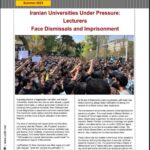
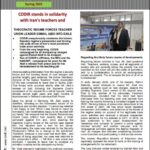




 Posted in
Posted in 
